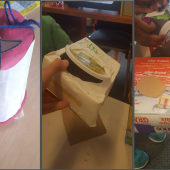
Abstract: This case study illustrates a cross-curricular learning experience, anchored in standards, where teachers and students actively engaged in co-constructed, inquiry-based learning and design thinking. The particular question this case study addressed was “How might students connect with environmental citizenship in authentic ways through media literacy experiences?” Specifically, the case study invited primary level learners to engage in a multimodal experience that was anchored in media literacy concepts and process. A pedagogical approach rooted in media literacy theory subsequently empowered students to make positive environmental changes in their communities and develop citizenship skills for the future. The project sought to develop awareness of sustainability through analysis, re-design, and production of snack food packaging. Educator reflections offer ideas for project improvement, such as producing for a wider audience, offering more choice, and making broader subject connections. This case study has implications for practice by demonstrating that, through various stages of scaffolding and integrated lesson design, young children are capable of applying sophisticated media literacy theory, inquiry, and design thinking to meet multiple curriculum standards.
Continue ReadingAbstract: In recent years, media scholars and educators have made an effort to address ecological issues in their work. Ecomedia literacy adapts the principles and practices of the media literacy movement in order to prepare the public to critically engage with the relationship between media and the environment. However, this article argues that the philosophical frameworks, on which existing approaches to media literacy education are founded, are limited. The field’s reliance on traditions of constructivism and cultural studies allows learners to engage with ideas, but not things. The article argues that an ecomedia literacy that draws from speculative realism—in particular, in recognizing the reality of non-human things, emphasizing materiality, and challenging the nature/culture divide—will more effectively prepare the public to critically engage and practically respond to pressing ecological issues such as climate change.
Continue Reading